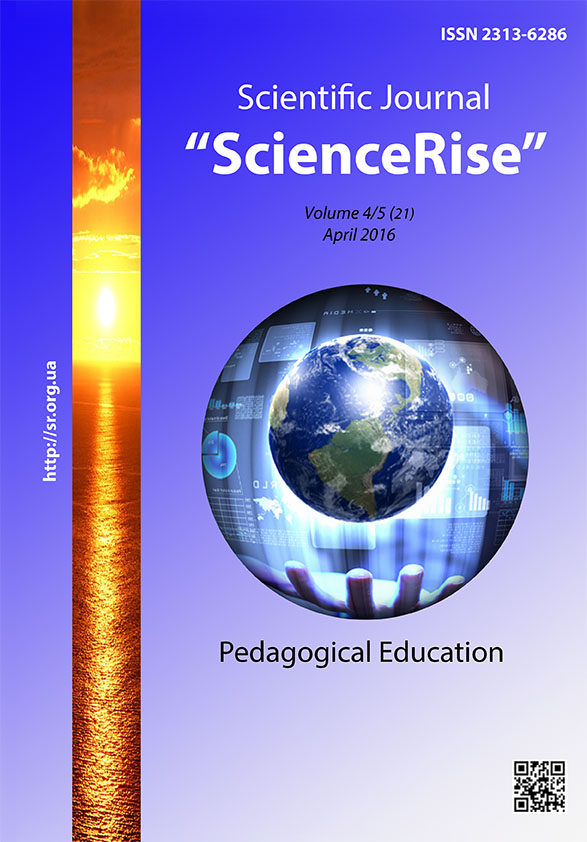Enhanced functions of teacher during the problem-based learning evolution (based on the experience of the European universities participating in the Tempus Medis project)
DOI:
https://doi.org/10.15587/2313-8416.2016.67711Ключевые слова:
problem-based learning, advanced problem-based learning, real problem-based learning, iteration, Agile methodologyАннотация
In modern conditions the training effectiveness increase relies mainly on the problem-based learning (PBL) methodology implementation. The article reveals the basic forms of PBL evolution and corresponding teaching staff functions. The study exposed detailed features of teacher role at each of the PBL stages methodology development on the example of teaching the industrial control system design. Taking into account these features will allow making the more accurate choice of the desired model for PBL implementation in teaching and learning process and preparing the relevant methodological support. Due to the teacher role complexity increasing with the PBL development the need for further training of instructors in the PBL methodology as well as in the relevant subject area is underlined.Библиографические ссылки
Rhem, J. (1998). Problem-Based Learning: An Introduction. The National Teaching & Learning Forum, 8 (1), 1–4. Available at: http://utminers.utep.edu/robertson/pdf/introduction_pbl_article.pdf
Iskrenko, E. V., Polton, T. A. (2008). Problemno-orientirovannoe obuchenie: osobennosti metodiki prepodavaniya v Velikobritanii (na primere St. George University of London, Great Britain). Zh. Nauchnyie vedomosti Belgorodskogo gosudarstvennogo universiteta. Seriya: Istoriya. Politologiya. Ekonomika. Informatika, 10 (8), 214–218.
Savery, J. R., Duffy, T. M.; Wilson, B. G. (Ed.) (1996). Problem-based learning: An instructional model and its constructivist framework. Constructivist Learning Environments: Case Studies in Instructional Design. New Jersey: Educational Technology Publications, 135–148.
Hassan, H., Martinez, J.-M., Dominguez, C., Perles, A., Albaladejo, J. (2004). Innovative Methodology to Improve the Quality of Electronic Engineering Formation Through Teaching Industrial Computer Engineering. IEEE Transactions on Education, 47 (4), 446–452. doi: 10.1109/te.2004.825541
Hassan, H., Dominguez, C., Martinez, J.-M., Perles, A., Albaladejo, J. (2007). Remote Laboratory Architecture for the Validation of Industrial Control Applications. IEEE Transactions on Industrial Electronics, 54 (6), 3094–3102. doi: 10.1109/tie.2007.907015
Hassan, H., Domínguez, C., Martinez, J. M., Perles, A., Albaladejo, J., Capella, J. V. (2008). Integrated Multicourse Project Based Learning in Electronic Engineering. International Journal of Engineering Education, 24 (3), 581–591.
Hernando, M., Galan, R., Navarro, I., Rodriguez-Losada, D. (2011). Ten Years of Cybertech: The Educational Benefits of Bullfighting Robotics. IEEE Transactions on Education, 54 (4), 569–575. doi: 10.1109/te.2010.2095014
Galchonkov, O. M., Loziienko, N. V. (2015). Advanced problem-based learning. The experience of the European universities participants to the TEMPUS MEDIS project. Odes’kyi Politechnichnyi Universytet. Pratsi, 2, 195–200. doi: 10.15276/opu.2.46.2015.33
Galchonkov, O., Nevrev, O., Loziienko, N. (2016). Real Problem-Based Learning: specific features of the training method for creation of modern industrial control systems (based on the experience of the European universities participating in (TEMPUS MEDIS). ScienceRise, 2/5 (19), 25–29. doi: 10.15587/2313-8416.2016.60621
Agile_software_development (2015). Wikipedia. Available at: https://en.wikipedia.org/wiki/Agile_software_development
544490-TEMPUS-1-2013-1-ES-TEMPUS-JPCR. A Methodology for the Formation of Highly Qualified Engineers at Masters Level in the Design and Development of Advanced Industrial Informatics Systems (2013). Universitat Politecnica de Valencia.
Загрузки
Опубликован
Выпуск
Раздел
Лицензия
Copyright (c) 2016 Oleg Galchonkov, Alexander Nevrev, Natalia Lozienko

Это произведение доступно по лицензии Creative Commons «Attribution» («Атрибуция») 4.0 Всемирная.
Наше издание использует положения об авторских правах Creative Commons CC BY для журналов открытого доступа.
Авторы, которые публикуются в этом журнале, соглашаются со следующими условиями:
1. Авторы оставляют за собой право на авторство своей работы и передают журналу право первой публикации этой работы на условиях лицензии Creative Commons CC BY, которая позволяет другим лицам свободно распространять опубликованную работу с обязательной ссылкой на авторов оригинальной работы и первую публикацию работы в этом журнале.
2. Авторы имеют право заключать самостоятельные дополнительные соглашения, которые касаются неэксклюзивного распространения работы в том виде, в котором она была опубликована этим журналом (например, размещать работу в электронном хранилище учреждения или публиковать в составе монографии), при условии сохранения ссылки на первую публикацию работы в этом журнале .

